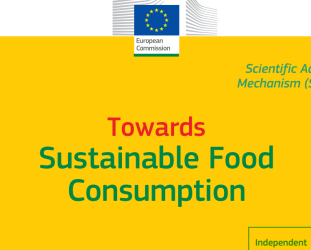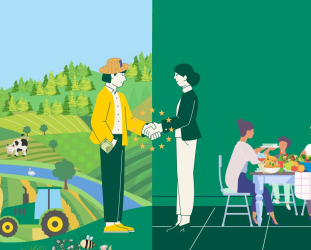Open Letter to the European Parliament: Boost sustainable investments in rural areas and green job creation. Reject further cuts to Pillar 2
02.09.2013 10:21:40

Brussels, 2 September 2013
Dear Member of the European Parliament,
This September the European Parliament Common Agricultural Policy (CAP) negotiation team has one last chance in the trilogue talks on CAP financial aspects to support increased spending for Rural Development 2014-2020 - which form the Pillar 2 of the CAP. Not only are the results of the June agreement wholly inadequate to effectively deliver a greener and fairer CAP by 2020, but the current Multiannual Financial Framework (MFF) 2014-2020 agreement will also disproportionately cut Rural Development funding over the next seven years. A July 2013 Parliament working paper shows that Pillar 2 expenditure will fall dramatically by 18% by 2020 compared to 2013, while Pillar 1 (direct payments) will be reduced by a much smaller 13%.I
For over a decade, Pillar 2 measures, in particular support for agri-environment schemes, organic farming, farm diversification, animal welfare and LEADER approaches have brought value for money, enhanced the long-term viability of farming enterprises and stimulated green job creation (For references and studies please consult the Annex attached). Previous reforms have enhanced the potential of Pillar 2 by introducing compulsory and voluntary mechanisms to increase available expenditure by transferring funds from Pillar 1 to Pillar 2. However failing to appropriately support these and other advanced sustainability measures under Rural Development in this reform will seriously undermine the ability of Member States to meet EU 2020 targets and transition Europe towards a green, low carbon economy. Worse still, the lack of Pillar 2 funding could reverse the positive outcomes of Rural Development resulting from past reforms.
We therefore urge the European Parliament and its negotiating team to work steadfastly to reduce the significant gap in Pillar 2 expenditure and support funding by:
- Incentivising Member States to move at least 15% of their Pillar 1 allocation to Pillar 2 for advanced sustainability measures without any mandatory national co-financing requirements
- Ensure that higher EU co-financing rates, of at least 75%, are offered for environmental and climate measures under Rural Development (in particular Article 29 and 30) that could discourage Member States from investing in new Rural Development programmes
- Rejecting the mechanism which would allow Member States to shift up to 15% of Pillar 2 funding to Pillar 1, and a further 10% for those countries with direct payments less than 90% of the EU average.
In the current economic climate the European Parliament must act on behalf of the public interest by ensuring that the final CAP legislation endorses a much needed boost for sustainable investments in threatened rural areas that can help set us back on track to securing concrete greener and fairer outcomes by 2020.
Yours sincerely, on behalf of the following organisations
Contact person: Antje Kölling, Policy Manager IFOAM EU Group, Antje.Koelling[at]ifoam-eu[dot]org, +32 (0)22806850
Annex: Evidence of sustainable Rural Development investments in agriculture and green job creation
- Studies of agri-environment schemes in the UK and Germany conducted in 2010 show that these programme are an important source of economic growth and job creation for rural areas. In England, for instance, for every £1 that supports a farmer or land manager who undertakes an agri-environment scheme an additional 26 pence was generated in the local economy. Over a 4-year period the equivalent of 665 additional full-time jobs were created in England.A In East Germany agri-environment measures generate 14,500 jobs for €1 billion invested annually.B
- A 2011 study conducted by the employment research consultancy GHK showed that rural development investments in organic farming and Natura 2000 have the potential to create up to three times more job than the direct payment support. An annual investment of €1 billion in direct payments creates an average of only 4,500 full time equivalent jobs whereas equivalent funding level targeted at Natura 2000, organic farming and agri-environment schemes would create 29,000, 7,800 and 6,600 jobs (net) respectively.C
- Research of employment level on organic farms in the UK and Ireland in 2011 found that organic farms employ the equivalent of 135% more full-time jobs than conventional farms. The study projects that if 20% farms were to be managed organically in the UK and Ireland, this would result in a job increase of 19% and 6% respectively.D
_____________
I Directorate-General for Internal Policies. Policy Department B: Structural and Cohesion Policies. 2013. European Council Conclusions on the Multiannual Financial Framework 2014-2020 and the CAP. Brussels: European Parliament.
_____________
A. Mills et al., 2010. Estimating the Incidental Socio-economic Benefits of Environmental Stewardship Schemes. Country and Community Research Institute. London: Department for Environment, Farming and Rural Affairs http://archive.defra.gov.uk/evidence/economics/foodfarm/reports/es-socioeconomic/esschemes-socioeconomic-100330.pdf
B Petrick M and Zier P., 2010. Regional employment impacts of Common Agricultural Policy measures in Eastern Germany: A difference-in-differences approach. SiAg-Working Paper 9, Berlin: Humboldt University http://ageconsearch.umn.edu/bitstream/93158/2/wp9.pdf
C GHK., 2011. Evaluating the Potential for Green Jobs in the next Multi-annual Financial Framework http://www.birdlife.org/eu/pdfs/Green_Jobs.pdf
D Morison, J., Hine, R. and Pretty, J., 2005. Survey and Analysis of Labour on Organic Farms in the UK and Republic of Ireland. International Journal of Agricultural Sustainability Volume 3 (1) http://www.tandfonline.com/doi/abs/10.1080/14735903.2005.9684742#.UhNeln89X2o
Latest Food Policy news

Euro Coop renews endorsement of Food Policy Coalition’s “Food Environments” policy brief
We have renewed our endorsement of the Food Policy Coalition ’s updated policy brief...

The EU SAM Released Policy Recommendations on Sustainable Food Consumption.
Euro Coop welcomes the release of scientific opinion and policy recommendations by the EU...

EU Food Policy Coalition Reports Four Priorities for SFS
A new report from the EU Food Policy Coalition outlines four priorities and policy...
Latest Food Policy stories

World Food Day 2023: Consumer Co-ops for Sustainable and Equitable Food Systems
As we come together to observe World Food Day, it is an opportune moment to reflect on the...

One Year into the Pandemic - Consumer Co-operatives' Stocktaking
Despite the health emergency and economic crisis, consumer co-operatives contributed and adapted...

Finnish Food Education Model Spreads Across Europe
School pupils are taught everyday food skills and smart consumerism in new, inspiring ways....

